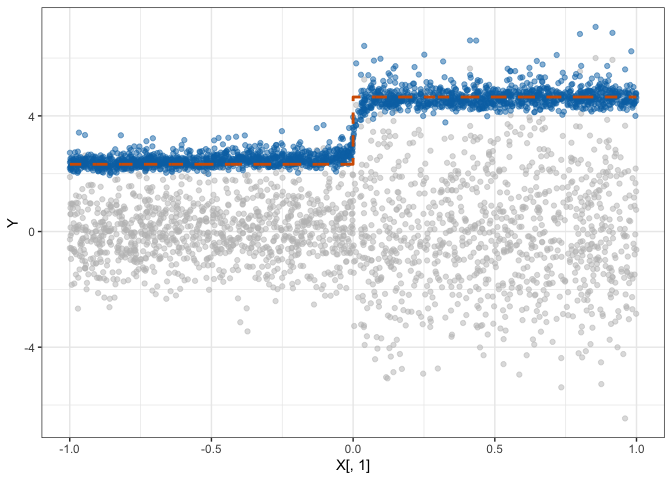The package erf implements the extremal random forests (ERF), an algorithm to predict extreme conditional quantiles in large dimensions.
Installation
install.packages("erf")You can install the development version from GitHub with:
# install.packages("devtools")
devtools::install_github("nicolagnecco/erf")Example
This basic example shows how to fit and predict conditional quantiles with erf.
library(erf)
library(ggplot2)
library(dplyr)
# Function to model scale
scale_step <- function(X) {
## numeric_vecotr -> numeric_vector
## produce scale function: scale(X) = step function
sigma_x <- 1 + 1 * (X > 0)
return(sigma_x)
}
# Generate data
set.seed(42)
n <- 2000
p <- 10
X <- matrix(runif(n * p, min = -1, max = 1), n, p)
Y <- scale_step(X[, 1]) * rnorm(n)
# Fit ERF
fit_erf <- erf(X, Y, intermediate_quantile = 0.8)
# Predict ERF
quantiles <- c(0.9, 0.99)
pred_erf <- predict(fit_erf, newdata = X, quantiles = quantiles)
true_quantiles <- matrix(rep(qnorm(quantiles), n),
ncol = length(quantiles),
byrow = TRUE) * scale_step(X[, 1])
# Plot results
my_palette <- list(
"red" = "#D55E00",
"blue" = "#0072B2"
)
ggplot() +
geom_point(aes(x = X[, 1], y = Y), alpha = .5, col = "grey") +
geom_point(aes(x = X[, 1], y = pred_erf[, 2]), alpha = .5,
col = my_palette$blue) +
geom_line(aes(x = X[, 1], y = true_quantiles[, 2]), col = my_palette$red,
linetype = "dashed", size = 1) +
theme_bw()